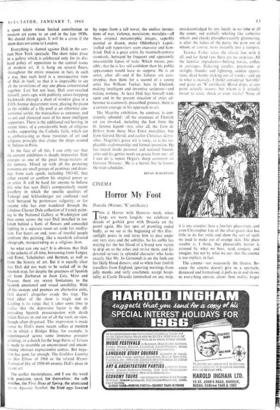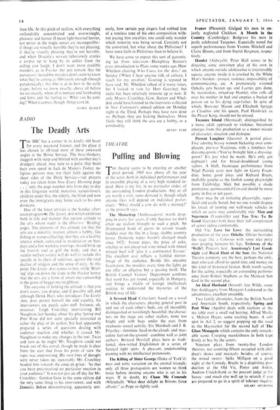CINEMA
Horror My Foot
Dracula. (Warner, 'X' certificate.)
Tins is Horror with Hammer week, when fangs are worn longish: we celebrate a decade of gothick gore with Dracula on the prowl again. His last spot of prowling ended badly, as we see at the beginning of this film : sunlight pours in and turns him to dust under our very eyes and the subtitles. So his coffin lies waiting for the hot blood of a brand new victim to drip on to the ashes and revive them, and his devoted servant (a splendid character who looks exactly like Mr. Jo Grimond) is on the look-out for likely blood donors; and so when four foolish travellers from England, ignoring warnings from jolly monks and surly coachmen, accept hospi- tality at Castle Dracula (unmarked on any map,
unacknowledged by any local), in no time at all the count, red eyeballs whirling like catherine wheels and cheeks phosphorescently glimmering. is after the ladies of the party, the prim one of whom, of course, turns instantly into a vampire.
Terence Fisher takes the classic line with it all, and for fiend fans there are no surprises. All the familiar ingredients—bolting horses, coffins in carriages, flickering candles, pinewoods at twilight, thunder and lightning, sudden appari- tions, dead hands sticking out of trunks—add up to what is (naively, I think) considered 'horrible' and given an 'X' certificate. Blood drips, at one point actually steams; but whom is it actually meant to scare, shock or even startle? None of
it is any creepier than a fun-fair ghost-train, and even Christopher Lee of the silver-green skin has little to do but smile and show the sort of teeth we used to make out of orange skin. The plain trouble is, I think, that pleasurable horror is aroused by what we hear, read, conjure, and imagine, but not by what we see; that the cinema is too explicit, in fact.
The cinema—not necessarily the theatre. Be- cause the cinema doesn't give us a spectacle, distanced and formalised, it pulls us in and shows us everything outsize, closer than reality, larger than life. At this pitch of realism, with everything outlandishly concentrated and overwrought, pleasure and horror (I mean light-hearted horror, not terror in the tragic sense) are incompatible: if things are visually horrible they're not pleasing, if they're visually pleasing they're not horrible, and when Dracula's servant laboriously cranks a corpse up to hang by its ankles from the ceiling you laugh. I don't want more credible murders, as in Psycho, but just remark that the purveyors' incredible murders don't seem to know what they're aiming at. Obviously enough (though paradoxically), this film is at its best in the early stages. before we knew exactly, above all before we see exactly. when all is menace and foreboding and hints and the feeling is : What can be com- ing? When it conies, though, things cave in.
IS ',BEL QUIGLY































 Previous page
Previous page